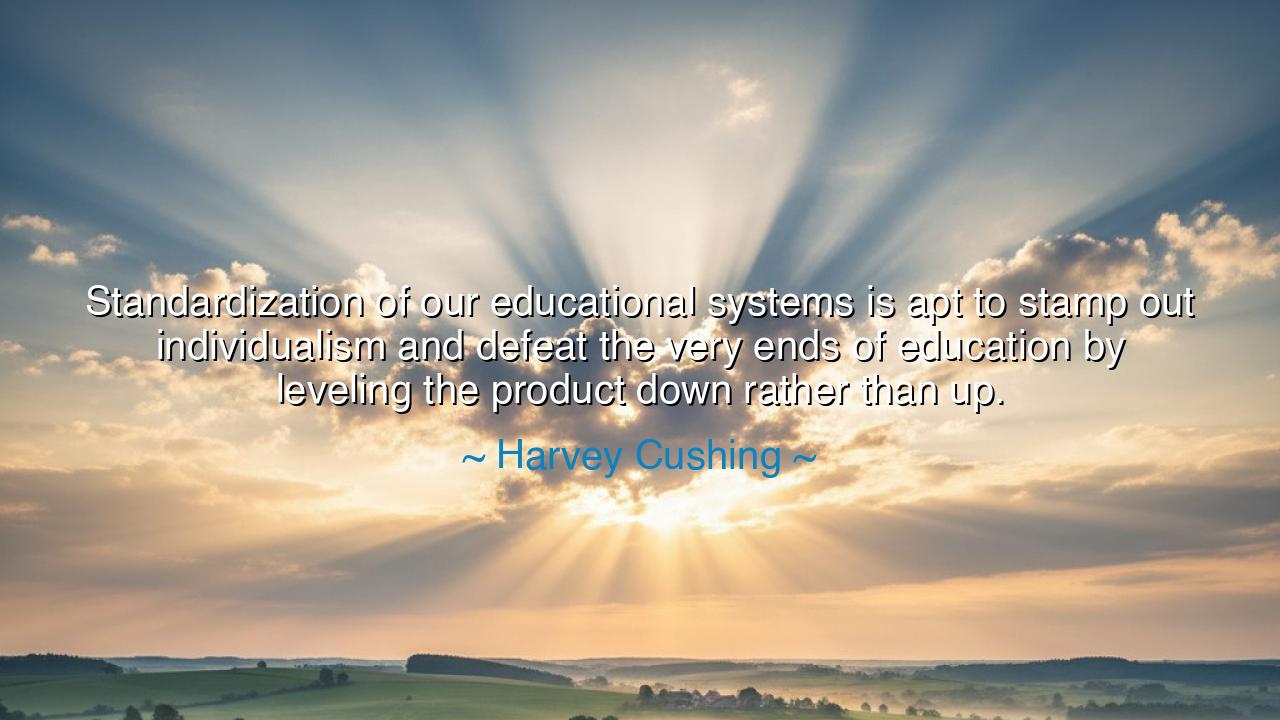
Standardization of our educational systems is apt to stamp out
Standardization of our educational systems is apt to stamp out individualism and defeat the very ends of education by leveling the product down rather than up.






Harvey Cushing, the pioneering neurosurgeon and seeker of truth, once warned: “The standardization of our educational systems is apt to stamp out individualism and defeat the very ends of education by leveling the product down rather than up.” These words are heavy with wisdom, for they speak to the eternal danger of treating human minds as though they were mere machines. When education is reduced to rigid molds and uniform measures, it forgets its sacred purpose: to awaken the soul, to nurture the gifts of each child, and to raise humanity upward into its fullest potential.
The ancients knew this danger well. In Athens, education was not only about memorizing facts, but about shaping citizens who could think, question, and participate in the life of the polis. Socrates, though condemned for his questioning, believed that true learning came not from rote formulas but from dialogue, self-discovery, and the pursuit of wisdom. Cushing’s words echo this ancient truth: when standardization becomes the idol of schooling, the fire of creativity is quenched, and individualism, the spark that drives invention and greatness, is extinguished.
Consider the story of Albert Einstein. As a child, he struggled in rigid schools that punished curiosity and demanded conformity. Teachers often mistook his silence for stupidity, his questioning for insolence. Yet it was precisely his refusal to be leveled down that allowed him to later pierce the mysteries of the universe. Had standardization succeeded in stamping out his individualism, the theory of relativity may never have come into being. Einstein’s story is proof that true education must raise minds up, not flatten them into sameness.
Cushing’s warning also holds a moral dimension. For when standardization reduces learners to products, it serves the convenience of institutions rather than the flourishing of the human spirit. It values efficiency over growth, order over originality. In such a world, the poet is silenced, the dreamer scorned, the inventor discouraged. What is lost is not only personal fulfillment, but the progress of society itself, which depends on the rare and unique contributions of individuals unafraid to walk a different path.
Yet his words do not call us to abandon all structure. For even the most fertile field needs boundaries, and even the wildest river requires banks to guide its flow. Education must balance guidance with freedom, structure with openness. The true danger arises when standardization becomes an end in itself, when the system values the uniform product more than the living soul. In such moments, education is no longer the ladder that lifts humanity upward, but the weight that drags it down.
The lesson for us is clear: guard the flame of individualism in every child, in every student, in every worker. Do not demand sameness where there is brilliance, nor punish difference where there is potential. Let education serve as a garden where diverse plants may grow, some tall, some fragrant, some strong, each contributing to the beauty of the whole. To level them all to the same height is to destroy the richness of the garden and to betray the very purpose of cultivation.
Practical action is within reach. Teachers must seek to draw out the unique gift in each student, not merely prepare them for examinations. Parents must encourage curiosity rather than force comparison. Leaders must design systems that lift the exceptional as well as support the struggling. And each of us must honor the individualism within ourselves, refusing to let the pressure of conformity dim the fire of our calling.
Thus, Harvey Cushing’s words echo across time as both warning and inspiration: standardization may bring order, but it must never destroy the soul of education. To raise humanity upward, we must protect individualism, nurture creativity, and remember always that the true end of education is not the making of identical products, but the awakening of unique and noble beings.






AAdministratorAdministrator
Welcome, honored guests. Please leave a comment, we will respond soon